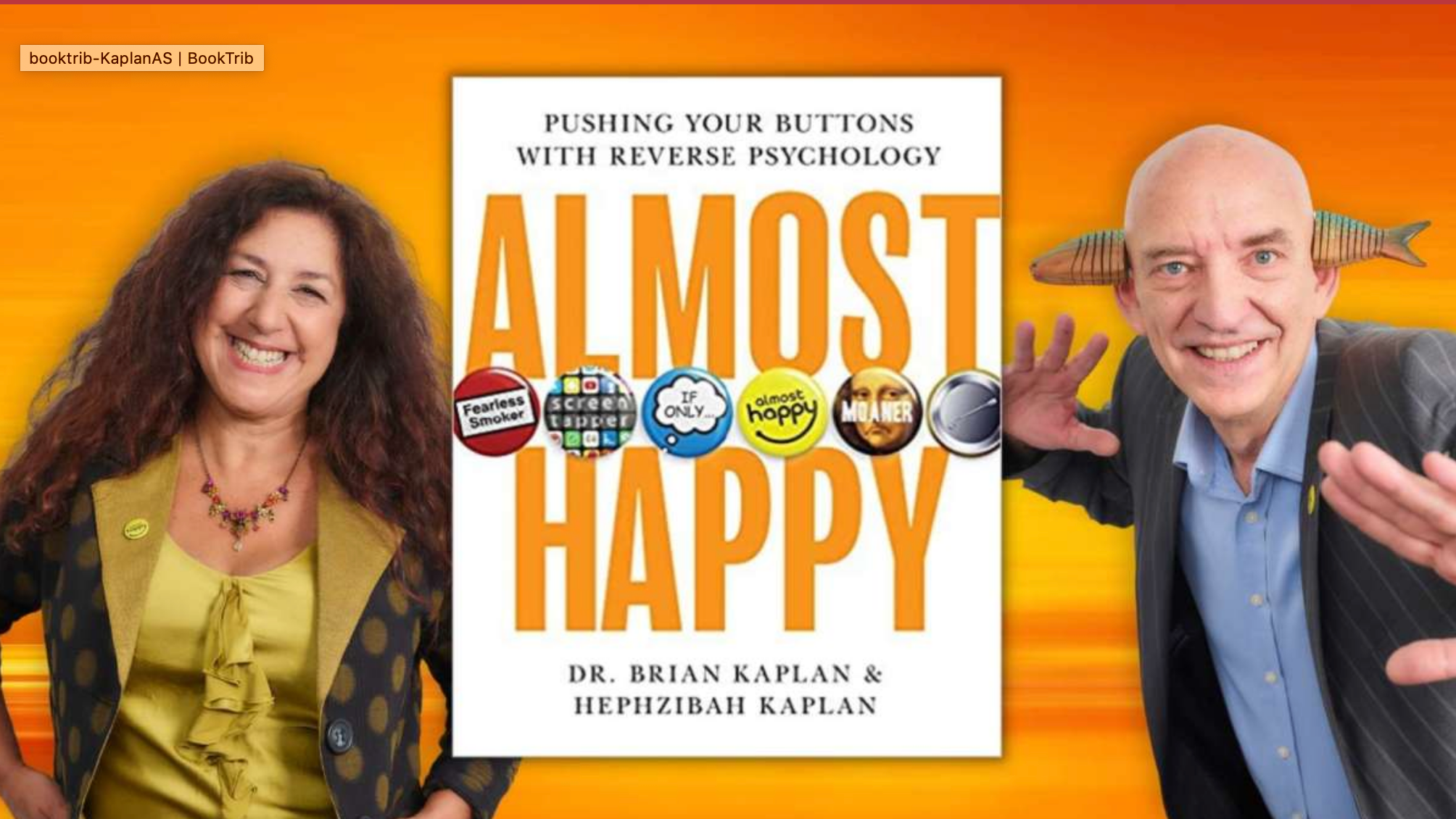Dr. Brian Kaplan and Hephzibah Kaplan, two comedy-loving health care professionals, know exactly what buttons to push to get you to laugh, and their book Almost Happy: Pushing Your Buttons With Reverse Psychology (Loba Publishing) won’t just tickle your funny bone, it’ll tickle your preconceived notions about therapy.
“Laughter can help us face the uncomfortable challenge of dealing with our personal difficulties,” says the husband and wife co-author team. Their approach? Provocative Therapy. While you’ve likely never heard of this form of psychotherapy, you probably have heard of one of its key elements: reverse psychology (it’s useful to more than just parents). Of course, the authors note that just telling people to do the opposite of what you want them to do is a bit simplistic; so they have developed a number of tools to stimulate positive change.
Their warm and responsible use of irony, satire and parody, provoke the emergence of conscience and common sense. In this Q&A, the author duo expands on their therapeutic approach and how embracing “what’s funny about ourselves” can take us from being almost happy, to claiming truly happy and fulfilling lives. Read our review of Almost Happy here.
Q: Where did the idea for this book come about?
A: We are both health care professionals with over 25 years of experience each and always shared a love of comedy — especially stand-up comedy.
In 1996, it was enlightening to discover an approach called Provocative Therapy, which creatively used comedy to help patients. It had been developed by Frank Farrelly, who became our teacher until his death in 2013. Frank wrote a textbook on the subject but there has been no book on the subject for the general public — until now. Almost Happy uses powerful graphics to give readers an easily accessible and visceral taste of what happens in Provocative Therapy.
Q: Why is humor such a practical and accessible way to effect change?
A: Humor is like an emulsifier softening the defenses to allow someone to think differently. When a person is induced to laugh at the parts of their personality that are holding them back, the laughter acts as a balm, making the transformative potential much more tolerable.
When humor is used with “affection in the heart and a twinkle in the eye” — the golden rule of using this approach — the client feels the empathy of the therapist or coach — and grasps the reverse psychology that comes with the humor.
Q: Tell us about reverse psychology and how it is used to make your points in the book.
A: Reverse psychology, a technique known to almost every parent, also works on adults. However, just telling people to do the opposite is one-dimensional. We utilize 36 Provocative Tools to stimulate change. “Do More of the Same!”; “Congratulate the person on having such a problem”; “Postpone making any sensible decision,” and so on. A list of 14 tools is in the appendix.
The “Provocative Suggestions,” which are typical of things said (with permission) to clients, can be seen as “suJestions” as we offer them in jest to tease the reader into action.
Q: Explain the use of the many buttons and what they are designed to encourage.
A: The buttons are there to provoke you to identify some of your more disruptive subselves. Some people respond to words, others more to images. The 114 originally-designed buttons stimulate a flash of recognition, an Aha! moment of “I can relate to that!” or “That’s exactly my sister!”
The button design graphically illustrates the feeling that the text communicates. They are a comic way to represent a subself visually and warmly, to convey something of the inner struggle that someone with that archetype may feel when visualizing themselves wearing it.
Q: How did your show-business backgrounds influence the tone of the book?
A: Brian has performed and collaborated on stage with top U.K. standup comedians such as Neil Mullarkey and Arnold Brown. His shows include The Academy of Laughter and Health and The Chutzpah Clinic as well as being the host of the podcast Are You Feeling Funny? where he interviews top U.K. comedians (including Stewart Lee, Shappi Korshandi, Isy Suttie and Jamali Maddix) about their health and how they use humor to tackle issues.
Hephzibah is an international teacher in her field so standing on stage with an audience of 350 does not phase her!
Q: What can readers expect to take away from this book?
A: We hope readers will be amused at their own domineering subselves and those of others! The aim is to arrive at a more harmonious symphony of subselves in order to alleviate stress, dump bad habits and improve relationships with themselves, their selves and others.
In offering provocative strategies to galvanize change, we share a different approach to managing our selves. This book is a go-to reference book for every time there may be an interpersonal or intrapersonal struggle or you need some good cheer. We feel less alone knowing that we share these archetypes with many others — as Mark Twain says “Against the assault of laughter, nothing can stand!”


